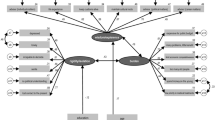Abstract
This study investigates the relation between age stereotypes and perceived age discrimination. Existing evidence for such a relation is notoriously ambiguous with regard to its direction—age stereotypes can predict (perceived) discrimination, but experiencing discrimination may also change views on ageing—which is why we used a dataset with two waves to disentangle the direction of the associations. Considering research on the multi-dimensionality of views on ageing and perceived age discrimination, we addressed this question from a domain- and age group-specific perspective. Drawing on data from two measurement points of the German Ageing Survey (DEAS; t 1: 2008, t 2: 2011; age range at t 1: 40–93 years, n = 6092 participants at t 1), we examined reciprocal relations between views on ageing and perceived age discrimination. Cross-lagged models revealed that domain-specific views on ageing predict subsequent changes in perceived discrimination in corresponding domains: Negative views on ageing regarding personal competence, physical decline, and social interactions were associated with increases in perceived discrimination in the domains of work, medical care, and social life, respectively. However, we did not find evidence for a reciprocal effect of perceived age discrimination on views on ageing. In sum, results indicate that negative views on ageing act as self-fulfilling prophecies by predisposing people to categorize other people’s behaviour as age discrimination or to act themselves in a way that might elicit ageist behaviour in others.


Similar content being viewed by others
References
AGG (2006) Allgemeines Gleichbehandlungsgesetz [General Act on Equal Treatment], BGBl. I S. 1897
Ayalon L (2014) Perceived age, gender, and racial/ethnic discrimination in Europe: results from the European Social Survey. Educ Gerontol 40:499–517. doi:10.1080/03601277.2013.845490
Baron RS, Burgess ML, Kao CF (1991) Detecting and labeling prejudice: Do female perpetrators go undetected? Pers Soc Psychol B 17:115–123. doi:10.1177/014616729101700201
Bendick M, Brown LE, Wall K (1999) No foot in the door: an experimental study of employment discrimination against older workers. J Aging Soc Pol 10:5–32. doi:10.1300/J031v10n04_02
Brockmann H (2002) Why is less money spent on health care for the elderly than for the rest of the population? Health care rationing in German hospitals. Soc Sci Med 55:593–608
Casper C, Rothermund K (2012) Gender self-stereotyping is context dependent for men but not for women. Basic Appl Soc Psychol 34:434–442. doi:10.1080/01973533.2012.712014
Casper C, Rothermund K, Wentura D (2011) The activation of specific facets of age stereotypes depends on individuating information. Soc Cognit 29:393–414. doi:10.1521/soco.2011.29.4.393
Diekman AB, Hirnisey L (2007) The effect of context on the silver ceiling: a role congruity perspective on prejudiced responses. Pers Soc Psychol B 33:1353–1366
Dittmann-Kohli F, Kohli M, Künemund H, Motel A, Steinleitner C, Westerhof G, with the infas Sozialforschung (1997) Lebenszusammenhänge, Selbst- und Lebenskonzeptionen [life contexts, conceptions of self and life]. Free University, Berlin
Downey G, Feldman SI (1996) Implications of rejection sensitivity for intimate relationships. J Pers Soc Psychol 70:1327–1343. doi:10.1037/0022-3514.70.6.1327
Fiske ST (1998) Stereotyping, prejudice, and discrimination. In: Gilbert DT, Fiske ST, Lindzey G (eds) The handbook of social psychology, 4th edn. McGraw-Hill, New York, pp 357–411
Garstka TA, Schmitt MT, Branscombe NR, Hummert ML (2004) How young and older adults differ in their responses to perceived age discrimination. Psychol Aging 19:326–335. doi:10.1037/0882-7974.19.2.326
GEDA (2009) Arztbesuch in den letzten 12 Monaten [Visit to the doctor during the last 12 month]. Robert Koch Institut
Hehman JA, Bugental DB (2015) Responses to patronizing communication and factors that attenuate those responses. Psychol Aging 30:552–560. doi:10.1037/pag0000041
Hess TM, Auman C, Colcombe SJ, Rahhal TA (2003) The impact of stereotype threat on age differences in memory performance. J Gerontol B-Psychol 58:3–11. doi:10.1093/geronb/58.1.P3
Horton S, Baker J, Pearce GW, Deakin JM (2008) On the malleability of performance: implications for seniors. J Appl Gerontol 27:446–465. doi:10.1177/0733464808315291
Huxhold O, Wurm S (2010) Altersdiskriminierung [Age discrimination]. In: Motel-Klingebiel A, Wurm S, Tesch-Römer C (eds) Altern im Wandel—Befunde des Deutschen Alterssurveys (DEAS). Kohlhammer, Stuttgart, pp 234–245
Inman ML (2001) Do you see what I see? Similarities and differences in victims’ and observers’ perceptions of discrimination. Soc Cognit 19:521–546. doi:10.1521/soco.19.5.521.19912
Kaiser CR, Hagiwara N, Malahy LW, Wilkins CL (2009) Group identification moderates attitudes toward ingroup members who confront discrimination. J Exp Soc Psychol 45:770–777. doi:10.1016/j.jesp.2009.04.027
Kornadt AE, Rothermund K (2011) Contexts of aging: assessing evaluative age stereotypes in different life domains. J Gerontol B-Psychol 66:547–556. doi:10.1093/geronb/gbr036
Kornadt AE, Rothermund K (2012) Internalization of age stereotypes into the self-concept via future self-views: a general model and domain-specific differences. Psychol Aging 27:164–172. doi:10.1037/a0025110
Kornadt AE, Rothermund K (2015) Views on aging: domain-specific approaches and implications for developmental regulation. Annu Rev Gerontol Geriatr 35:121–144. doi:10.1891/0198-8794.35.121
Kornadt AE, Voss P, Rothermund K (2015a) Age stereotypes and self-views revisited: Patterns of internalization and projection processes across the life span. J Gerontol B-Psychol. doi:10.1093/geronb/gbv099
Kornadt AE, Voss P, Rothermund K (2015b) Hope for the best, prepare for the worst? Future self-views and preparation for age-related changes. Psychol Aging 30:967–976. doi:10.1037/pag0000048
Krings F, Sczesny S, Kluge A (2011) Stereotypical inferences as mediators of age discrimination: the role of competence and warmth. Brit J Manag 22:187–201. doi:10.1111/j.1467-8551.2010.00721.x
Krueger JI (2007) From social projection to social behaviour. Eur Rev Soc Psychol 18:1–35. doi:10.1080/10463280701284645
Lamont RA, Swift HJ, Abrams D (2015) A review and meta-analysis of age-based stereotype threat: negative stereotypes, not facts, do the damage. Psychol Aging 30:180–193. doi:10.1037/a0038586
Levy B (2009) Stereotype embodiment: a psychosocial approach to aging. Curr Dir Psychol Sci 18:332–336. doi:10.1111/j.1467-8721.2009.01662.x
Levy BR, Leifheit-Limson E (2009) The stereotype-matching effect: greater influence on functioning when age stereotypes correspond to outcomes. Psychol Aging 24:230–233. doi:10.1037/a0014563
Lindeman M (1997) Ingroup bias, self-enhancement and group identification. Eur J Soc Psychol 27:337–355. doi:10.1002/(SICI)1099-0992(199705)27:3<337:AID-EJSP825>3.0.CO;2-S
Major B, Sawyer PJ (2009) Attributions to discrimination: antecedents and consequences. In: Nelson TD (ed) Handbook of prejudice, stereotyping, and discrimination. Psychology Press, New York, pp 89–110
North MS, Fiske ST (2013) Subtyping ageism: policy issues in succession and consumption. Soc Issues Policy Rev 7:36–57. doi:10.1111/j.1751-2409.2012.01042.x
O’Brien LT, Kinias Z, Major B (2008) How status and stereotypes impact attributions to discrimination: the stereotype-asymmetry hypothesis. J Exp Soc Psychol 44:405–412. doi:10.1016/j.jesp.2006.12.003
Pavalko EK, Mossakowski KN, Hamilton VJ (2003) Does perceived discrimination affect health? Longitudinal relationships between work discrimination and women’s physical and emotional health. J Health Soc Behav 44:18–33. doi:10.2307/1519813
Pinel EC (1999) Stigma consciousness: the psychological legacy of social stereotypes. J Pers Soc Psychol 76:114–128. doi:10.1037/0022-3514.76.1.114
Robbins JM, Krueger JI (2005) Social projection to ingroups and outgroups: a review and meta-analysis. Pers Soc Psychol Rev 9:32–47. doi:10.1207/s15327957pspr0901_3
Rodin MJ, Price JM, Bryson JB, Sanchez FJ (1990) Asymmetry in prejudice attribution. J Exp Soc Psychol 26:481–504. doi:10.1016/0022-1031(90)90052-N
Rothermund K (2005) Effects of age stereotypes on self-views and adaptation. In: Greve W, Rothermund K, Wentura D (eds) The adaptive self: personal continuity and intentional self-development. Hogrefe Huber Publishers, Ashland, pp 223–242
Rothermund K, Brandtstädter J (2003) Age stereotypes and self-views in later life: evaluating rival assumptions. Int J Behav Dev 27:549–554. doi:10.1080/01650250344000208
Rothermund K, Mayer A-K (2009) Altersdiskriminierung: Erscheinungsformen, Erklärungen und Interventionsansätze [age discrimination: manifestations, explanations and intervention approaches]. Kohlhammer, Stuttgart
Satorra A, Bentler PM (2001) A scaled difference Chi square test statistic for moment structure analysis. Psychometrika 66:507–514. doi:10.1007/BF02296192
Schermuly CC, Deller J, Büsch V (2013) A research note on age discrimination and the desire to retire: the mediating effect of psychological empowerment. Res Aging 36:382–393. doi:10.1177/0164027513508288
Schmitt MT, Branscombe NR (2002) The meaning and consequences of perceived discrimination in disadvantaged and privileged social groups. Eur Rev Soc Psychol 12:167–199
Schneider DJ (2004) The psychology of stereotyping. Guilford Press, New York
Snellman F, Nygård M, Jungerstam S (2013) Conceptions and tendencies of age discrimination and attitudes towards older people in selected regions in Finland and Sweden. Nord J Soc Res 4:115–138
Steverink N, Westerhof GJ, Bode C, Dittmann-Kohli F (2001) The personal experience of aging, individual resources, and subjective well-being. J Gerontol B-Psychol 56:364–373. doi:10.1093/geronb/56.6.P364
Vogt Yuan AS (2007) Perceived age discrimination and mental health. Soc Forces 86:291–311. doi:10.1353/sof.2007.0113
Voss P, Rothermund K (2016) Altersdiskriminierung in institutionellen Kontexten [age discrimination in institutional contexts]. In: Kracke B, Noack P (eds) Handbuch Entwicklungs- und Erziehungspsychologie, Springer, Heidelberg
Wolff JK, Warner LM, Ziegelmann JP, Wurm S (2014) What do targeting positive views on ageing add to a physical activity intervention in older adults? Results from a randomised controlled trial. Psychol Health 29:915–932. doi:10.1080/08870446.2014.896464
Wurm S, Benyamini Y (2014) Optimism buffers the detrimental effect of negative self-perceptions of ageing on physical and mental health. Psychol Health 29(7):832–848. doi:10.1080/08870446.2014.891737
Wurm S, Tesch-Römer C, Tomasik MJ (2007) Longitudinal finding aging-related cognitions, control beliefs, and health in later life. J Gerontol B-Psychol 62:156–164. doi:10.1093/geronb/62.3.P156
Acknowledgments
This work was supported by the European Cooperation in Science and Technology (COST) Action on ageism (IS1402).
Funding
The German Ageing Survey was funded by German Federal Ministry for Family, Senior Citizens, Women and Youth Grant 301-1720-2/2. Preparation of this article was made possible by a grant from the VolkswagenStiftung as part of the project “Ageing as future” (Az. 86 758) to Klaus Rothermund.
Author information
Authors and Affiliations
Corresponding author
Additional information
Responsible editor: Liat Ayalon and Clemens Tesch-Römer (guest editors) and Howard Litwin.
Rights and permissions
About this article
Cite this article
Voss, P., Wolff, J.K. & Rothermund, K. Relations between views on ageing and perceived age discrimination: a domain-specific perspective. Eur J Ageing 14, 5–15 (2017). https://doi.org/10.1007/s10433-016-0381-4
Published:
Issue Date:
DOI: https://doi.org/10.1007/s10433-016-0381-4




